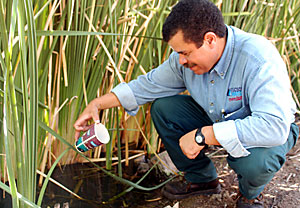 |
|
CLAIRE C. LAURENCE/Arizona Summer Wildcat
|
Public Information Specialist Joaquim Delgado demonstrates the effectiveness that the mosquito population deterrent plan has had on the Sweetwater Wetland by examining the insect's scarcity. Delgado explained that there have been few to no adults and larvae found on the marsh and said that "you'll probably find more in your own backyard."
|
|
|
By Nathan Tafoya
Arizona Daily Wildcat
Wednesday, July 21, 2004
Print this
In 2003, Arizona was introduced to the West Nile virus via its bird population. The virus has begun infecting humans and Arizona now leads the nation in the number of West Nile cases.
However, an experimental antibody from Israel that has been undergoing clinical trials across the nation for the past year will soon be available to certain infected Arizonans. The University of Arizona will administer the drug in Pima County, which has yet to see a single case.
Maricopa County has reported most of Arizona's 114 cases of West Nile and two deaths, a woman in her 70s and a man in his 60s. There is currently no treatment for West Nile infection.
"We expect that what you see in Maricopa County will come down to the Tucson area, the Pima County area, later," said Dr. Eskild Petersen, chief of adult infectious diseases at the UA.
Petersen added that he expects to begin seeing cases in the next few weeks. He said the Human Subjects Committee has not yet given the UA permission to use the drug.
Petersen said the drug is part of the National Institutes of Health's clinical trial to treat people who have neurological problems due to the virus.
Such neurological problems, called encephalitis, are rare. The inflammation of the brain can cause headache, disorientation, seizures, muscle weakness and coma.
"The vast majority of people will have no signs or symptoms of being infected with the West Nile fever," said Petersen. He added that only about one in five people show symptoms from the virus at all and that about one in 150 develop encephalitis.
 |
If we are going to a have a problem, this is the year we are going to have a problem.
– Dr. Eskild Petersen
|
 |
Petersen said no one knows how big a problem the virus is going to be in Arizona.
"If we are going to a have a problem, this is the year we are going to have a problem," said Petersen. "Just like Colorado last year had a tremendous number and the year before (that), it hardly had any. It's the first year that it really comes into the population that you have a problem."
According to Petersen, the number of cases subsides after the first year because a smaller number of birds are susceptible to the virus. He said West Nile is primarily a bird virus.
The Arizona Department of Health Services Web site said mosquitoes become infected when they feed on birds carrying the virus and that only mosquitoes, not birds or other animals, can transmit the disease to humans.
"We're entering our monsoon season now," said Elizabeth Willott, professor of entomology. "We can expect our mosquito numbers to go up. Maricopa County is getting hit pretty hard. It's likely we'll get some down here too."
The new threat of infection has prompted health officials to urge Arizonans to protect themselves by eliminating standing water where mosquitoes can breed.
They suggest checking for items outside the home that collect water, such as cans, bottles, buckets, old tires, drums and other containers.
Students can protect themselves by wearing lightweight clothing that covers their arms and legs during dawn or dusk and in areas where mosquitoes are active.
Tucson's Sweetwater Wetland, located east of the Santa Cruz River near Prince Road, is made up of approximately 18 acres of shallow wetland ponds and is planted with various species of vegetation and cattail. It has gotten press coverage for its mosquito presence in past years.
Joaquim Delgado from Tucson Water said Sweetwater Wetland's Mosquito Abatement Program is intended to minimize public health risks.
"We trap mosquitoes every week and we send samples to the University of Arizona Department of Entomology as well as samples to the health department," said Delgado. "Out of the thousands and thousands of samples that we've collected, we had two positive samples several years ago."
The program also includes weekly applications (from February to November) of low-toxicity larvicides, which kill only mosquito larva and spare their natural predators. Controlled burns also keep the vegetation in which the mosquitoes live under control.
Delgado also said that mosquitoes do not usually travel beyond two miles so the only threat, if any, posed by Sweetwater Wetland, are to those within a two-mile radius of it.
The Arizona Department of Health Services has created a Web site, www.westnileaz.com, and a toll-free number, 1-800-314-9243, to provide additional information about symptom identification and treatment for the West Nile virus.

